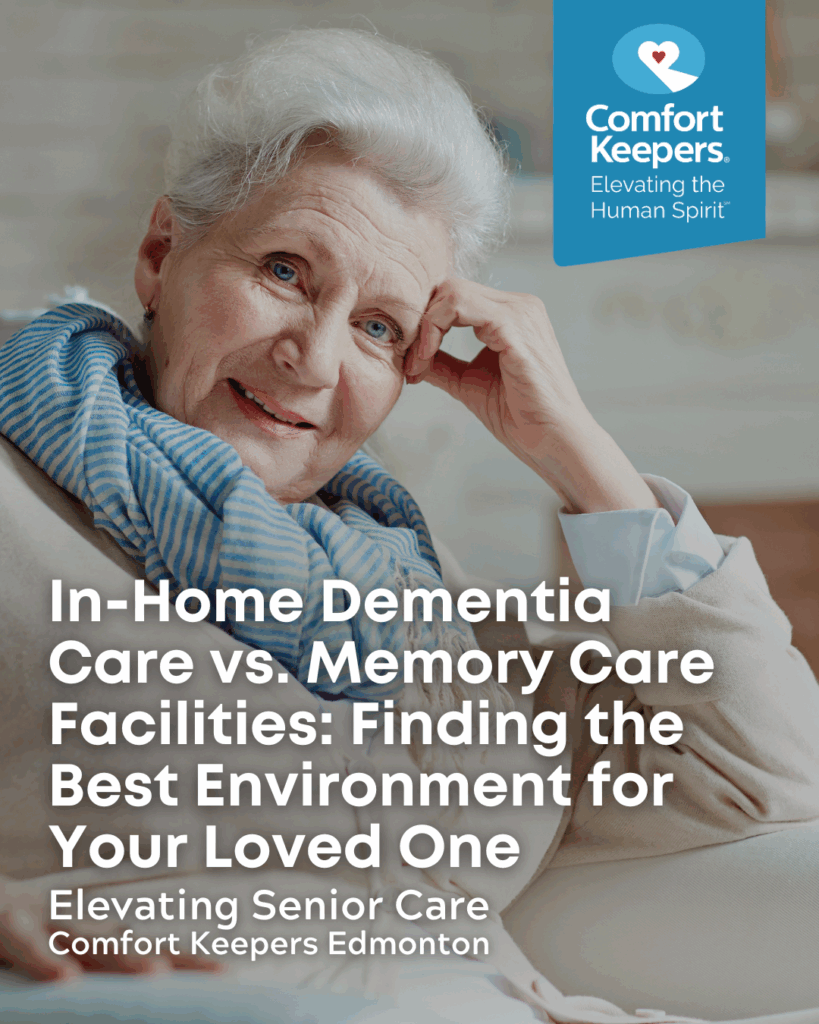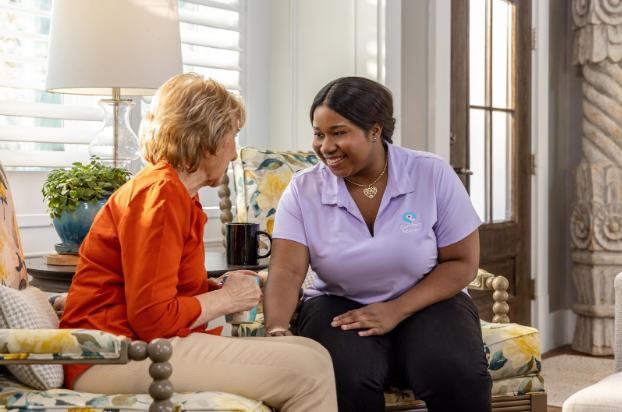In-Home Dementia Care vs. Memory Care Facilities: Finding the Best Environment for Your Loved One
Alzheimer's and Dementia Care | July 28, 2025
Making care decisions for a loved one with dementia is more than a logistical puzzle; it’s an emotional journey. You’re balancing medical needs, safety concerns, and financial realities, all while navigating feelings of stress, grief, and the profound desire to do what’s best. The choice between in-home dementia care vs. memory care facilities can feel overwhelming, with each path presenting its own set of questions.
You’re not just looking for a list of pros and cons. You’re looking for a clear, compassionate path to a confident decision. This guide is designed to provide just that. We’ll move beyond surface-level comparisons to help you evaluate what truly matters: your loved one’s well-being, their stage of dementia, and your family’s unique situation.
The Core Differences: Environment, Care, and Cost

Comparison: In-Home Dementia Care vs. Memory Care Facility
At a glance, the two options seem straightforward. One is care at home; the other is care in a specialized residence. But the differences in daily life, cost, and philosophy are significant.
| Factor | In-Home Dementia Care | Memory Care Facility |
| Environment | The familiar, comfortable, and consistent setting of their own home. | A secure, structured environment with other residents and staff. |
| Level of Care | One-on-one, personalized care from a dedicated caregiver tailored to specific needs and routines. | Staff provides care for multiple residents; care is structured around the facility’s schedule. |
| Socialization | Consistent companionship from a caregiver, with opportunities for community engagement based on the individual’s abilities. | Structured group activities and daily interaction with other residents and staff. |
| Personal Autonomy | High degree of independence and control over daily schedules, meals, and activities. | Lower level of personal autonomy; daily life follows a predetermined facility schedule. |
| Family Involvement | Families can be highly involved in daily care decisions and routines. | Family involvement is typically through scheduled visits and care plan meetings. |
| Typical Cost | Averages $36 per hour. For 40 hours/week, this is about $6,240 per month. | National median cost is approximately $7,292 per month for a semi-private room. |
Please note: To support aging in place, the Government of Alberta provides funding that helps people remain comfortably at home.
The Most Important Factor: Your Loved One’s Stage of Dementia
A generic comparison only gets you so far. The best environment for your loved one depends heavily on where they are in their journey with dementia. Needs change, and the right solution today might be different from the right solution a year from now.
Early-Stage Dementia: Prioritizing Familiarity and Independence
In the early stages, individuals can often live quite independently but may need help with reminders, organization, or transportation. The primary goal is to maintain their routine and sense of self.
Why In-Home Care Often Excels:
- Preserves Normalcy: Staying at home minimizes the confusion and anxiety that can come with a new environment.
- Builds Trust: A consistent, one-on-one caregiver can become a trusted companion, which is crucial as the condition progresses.
- Targeted Support: Care can be scheduled for just a few hours a day or week to help with specific tasks like meal prep, errands, and managing appointments, making it a flexible and cost-effective option.
For families at this stage, focusing on creating a safe home environment for seniors with dementia can make a world of difference in extending their independence.
Mid-Stage Dementia: The Tipping Point
As dementia progresses into the middle stages, the need for support becomes more significant. Symptoms like wandering, increased confusion, and behavioral changes become more common. This is often the point where families feel the most pressure to consider a facility.
How to Evaluate Your Options:
- Safety vs. Familiarity: A memory care facility offers a secure perimeter to prevent wandering. However, specialized in-home care can achieve a high level of safety through trained caregivers and technology without the emotional toll of a move.
- One-on-One vs. Group Care: In a facility, staff must divide their attention. At home, a dedicated caregiver can focus entirely on your loved one, providing redirection and managing challenging behaviors with patient, personalized techniques.
- The Hybrid Model: Many families find success by supplementing specialized in-home care with adult day programs. This provides the social stimulation of a group setting while maintaining the comfort of home.
Understanding the typical progression through the stages of Alzheimer’s and dementia: a family guide can help you anticipate these changes and plan accordingly.
Late-Stage Dementia: Focusing on Comfort and Dignity
In the late stages, individuals require extensive, often 24/7, assistance with all aspects of daily living. The focus shifts entirely to comfort, dignity, and intensive personal care.
When a Facility May Become the Right Choice:
- Complex Medical Needs: If your loved one requires round-the-clock skilled nursing care (like tube feeding or advanced wound care) that goes beyond the scope of non-medical in-home care, a facility with integrated medical staff may be necessary.
- Caregiver Burnout: The demands of late-stage care can be physically and emotionally exhaustive. Unpaid family caregivers provide an estimated $247 billion in care annually—a testament to their dedication, but also a sign of the immense burden they carry. A move may become the most compassionate choice for the well-being of the entire family.
Even in these advanced stages, many families opt for in-home palliative or end-of-life care to allow their loved one to remain in a peaceful, familiar environment.
Beyond the Logistics: The Unspoken Factors in Your Decision
This choice is deeply personal, and the right answer isn’t on a spreadsheet. It lies in understanding the emotional and psychological needs of both your loved one and your family.
Honoring Their Independence and Dignity
For a person with dementia, their home is more than just a building – it’s a repository of memories, a symbol of their identity, and the last bastion of their independence. While safety is paramount, preserving their dignity is just as important. The ability to sit in their own chair, sleep in their own bed, and follow their own rhythm can have a profound impact on their quality of life.
Managing Caregiver Guilt and Well-being
It’s easy to feel that you are failing if you can’t do it all yourself. This feeling of guilt is a heavy burden. Remember, seeking professional help is a sign of strength, not weakness. Whether you choose in-home support to give yourself a needed respite or a facility for intensive care, you are making a decision based on love and responsibility. Improving your communication tips for caring for a loved one with dementia can also ease the strain and foster a stronger connection.
Dementia Care Assessment Checklist
Use these questions to guide a thoughtful conversation with your family and assess your specific situation.
About Your Loved One:
☐ What is their current stage of dementia?
☐ Can they still express their own preferences? Have they?
☐ Do they have behavioral challenges like wandering or aggression?
☐ How do they react to new people or environments?
☐ What are their primary medical needs?
About Your Home Environment:
☐ Is the home layout safe and easy to navigate? (e.g., single-story, few trip hazards)
☐ Is the location secure? How close are neighbours or family?
About Your Family and Caregiving Capacity:
☐ What is the primary caregiver’s physical and emotional state?
☐ How many hours of care per day are truly needed?
☐ What is your budget for care? Have you compared the cost of 24/7 home care vs. a facility?
☐ Can technology (like monitoring sensors) help bridge any gaps?
Frequently Asked Questions
Isn’t a memory care facility always safer for someone who wanders?
Not necessarily. While facilities are secured, the one-on-one attention from a dedicated in-home caregiver can often prevent wandering before it starts by engaging the client and redirecting their attention. Technology like door sensors and GPS tracking can also provide a powerful safety net at home.
I’m worried my mom will be lonely and isolated at home. Is a facility better for socialization?
Forced socialization in a group setting can be overwhelming for someone with dementia. Quality is more important than quantity. The consistent, meaningful companionship from a caregiver who understands their personality and interests—what we call Interactive Caregiving™—can be more effective at combating loneliness than being in a room full of people.
Can in-home care handle advanced dementia symptoms like aggression or sundowning?
Yes. A key advantage of professional in-home care is the specialized training caregivers receive. At Comfort Keepers, our caregivers are trained to understand the triggers for challenging behaviors and use techniques like redirection, validation, and creating calm routines to de-escalate situations and provide compassionate support.
Making a Confident, Compassionate Choice
There is no single “best” answer in the debate between in-home care and memory care facilities. The best choice is the one that honors your loved one’s dignity, ensures their safety, and supports the well-being of your entire family.
For many, in-home care provides the ideal balance—offering expert, one-on-one support within the comforting and familiar environment of home. It allows for a personalized approach that can adapt as your loved one’s needs change, preserving their independence for as long as possible.
If you are exploring your options, the first step is a simple conversation. Our team and Comfort Keepers Edmonton can help you understand your loved one’s needs and develop a personalized care plan that elevates their spirit and brings your family peace of mind.
Comfort Keepers® Edmonton is Proud to Offer a Wide Range of Home Senior Care Services
Our trained caregivers will ensure your loved one is comfortable, independent and safe in their home. On top of that, we will also aim to enhance their overall health, quality of life and general happiness.
Top-Notch Home Healthcare for Seniors in Edmonton, Alberta
Comfort Keepers of Edmonton offers a broader range of senior care services. We offer retirement care, respite care, senior care, companionship care, end-of-life care, post-surgery care, palliative care, personal care, and senior living transition services. If you are concerned about the health and well-being of your aging loved ones, we can provide 24-hour care and more!
Helping Seniors Age-in-Place with Companionship Care and Interactive Caregiving™
Empathetic care starts in the heart and allows us to meet our client’s needs. Our trained caregivers are selected with one specific quality in mind, empathy. We strive to stimulate our clients emotionally, mentally and socially, thus enhancing their overall quality of life.
Our Interactive Caregiving™ provides a system of care that addresses companionship, safety, nutrition, mind, body, and activities of daily living (ADLs). The system increases seniors’ sense of well-being, independence and companionship by focusing on Senior Mind, Senior Body, Senior Nutrition, and Senior Safety.
When you are ready to start exploring your homecare options here is a guide on what to ask a homecare company
Affordable and Client-Directed Homecare is Available for Qualifying Albertans
Comfort Keepers® Edmonton is an Approved Service Provider for the Client Directed Homecare Invoicing (CDHCI) Program Offered by Alberta Health Services.
What is the Client Directed Home Care Invoicing Program (CDHCI)?
CDHCI is a great program provided by Alberta Health Services (AHS), allowing clients to choose an approved agency like Comfort Keepers Edmonton for Personal Care, Respite Care and Homemaking needs. The chosen agency can then bill AHS directly for services rendered for approved hours through Alberta Blue Cross. Read more about the program HERE.
Accredited Home Care Edmonton
Comfort Keepers® Edmonton was awarded the “Accredited with Exemplary Standing” seal by Accreditation Canada. This honour demonstrates Comfort Keepers’ commitment to offering safe, high-quality home care to its senior clients in Edmonton, AB.
To learn more about senior in-home care in Edmonton, contact the Comfort Keepers® office. Our service territory includes Edmonton, Devon, Sherwood Park, Stony Plain and surrounding areas, contact the Comfort Keepers Edmonton office at 780-465-4665.
Individualized Home Care Options
Long-Term Home Care, 24 Hour Home Care & Short Term Care Options Customized for You







